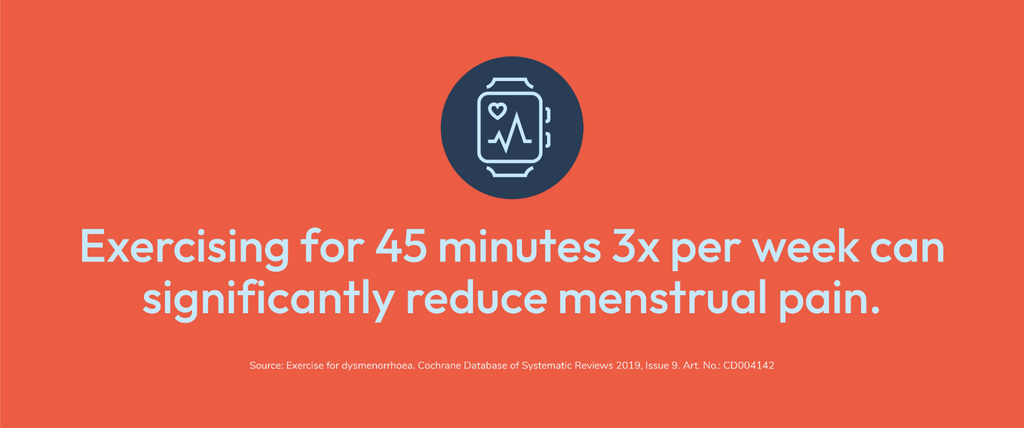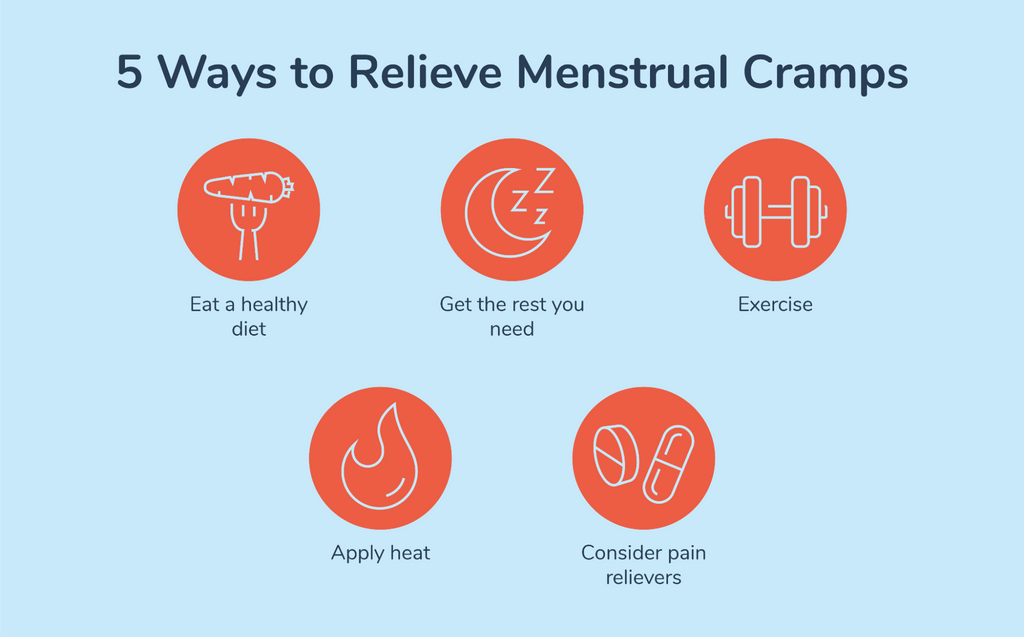Free U.S. shipping & money back guarantee

5 min read
| March 04, 24
5 Ways to Get Rid of Cramps: Say Goodbye to Period Pain
Article summary
Menstrual cramps can range in severity, but there are home remedies that can help alleviate some of the pain and discomfort you may experience each month. Changes in diet, better sleep, pain relievers, heat application, and exercise may all help reduce the pain of period cramps and relieve symptoms of PMS.

Why do customers love Uqora?
Innovative urinary care
Research-backed products
Money-back guarantee
Article contents
Article contents
Do you dread the start of your period every month? Same here. That’s why we researched the ins and outs of menstrual cramps to bring you 5 ways to get rid of the pain. First off, menstrual cramps are completely normal, but for many – they can feel very painful! The good news is that there are many ways to help make your period pain more manageable.
We’ve put together this guide to help you find ways to minimize your menstrual symptoms.
What causes menstrual cramps?
To properly treat your menstrual cramps, it’s important to first understand why they happen. During our menstrual cycle, the uterus sheds its lining, which includes tissue and blood. To make this shedding occur, the muscles within your uterus and your blood vessels contract, triggered by a hormone-like substance called prostaglandin, which are involved in pain and inflammation (1) .
It is these contractions that result in cramping, most often felt in the lower abdomen, hips, thighs, and lower back (2) .
Having a period is not easy, and unfortunately, cramps aren’t the only uncomfortable premenstrual syndrome (PMS) side effect. Other symptoms you may experience in addition to cramps include (1) :
- Fatigue
- Bloating
- Diarrhea or loose stools
- Headache
- Nausea
Fortunately, there are ways to help alleviate these symptoms and make the period pain and discomfort more manageable.
Ways to get rid of menstrual cramps
The next time your period brings on painful menstrual cramps, try some of these relief methods:
1. Consider your diet
The foods you eat can play a crucial role in determining your overall health –influencing factors like energy levels, weight management, disease risk, and your overall well-being. A balanced diet can support hormonal regulation, potentially leading to milder period symptoms (3) .
Dr. Payal Bhandari, M.D., a leading practitioner of integrative functional medicine and the founder of SF Advanced Health, provides great recommendations for foods that may help with menstrual symptoms.
“Include a variety of dark leafy green vegetables, legumes (i.e. lentils, moong dal, and split peas), and unrefined whole grains (i.e. millet, buckwheat, quinoa, barley, and brown rice). Focus on having mostly plant protein (a.k.a., all whole foods except fruit) which are rich in nutrients and antioxidants, the real immune boosters.
Sauté or steam food with a touch of olive, avocado, coconut, or flax oil. Alternatively, cover food with pre-soaked chia, hemp, or flax seeds, or add an avocado to your meal. These oils help you to absorb nutrients effectively.”
It’s also important to consider foods and beverages that may have a worsening effect on your PMS symptoms. Dr. Bandhari recommends avoiding the following foods to promote a strong immune system and get rid of period cramps:
- Refined sugar and flour products such as baked goods, sweets, candy, chips
- Artificial sweeteners
- Processed foods, including dry cereal, granola or protein bars, chips, crackers, and ready-to-eat dry or frozen meals.
- Fried food
- Caffeine such as coffee, black or iced tea, caffeinated green tea, chai, chocolate, hot chocolate, soda, and energy drinks
- Alcoholic beverages
2. Get the rest you need
Getting quality sleep every night can help you maintain a strong immune system (4) . Make sure you’re getting enough sleep at night; while the amount of sleep needed to feel great can vary from person to person, it’s important to prioritize great rest.
You can also try to find ways to de-stress your mind to support your body. Studies have shown that stress can exacerbate cramps. Females who feel stressed two weeks before the beginning of their menstrual cycle are two to four times more likely to experience moderate to severe menstrual symptoms than females who are not stressed (5) .
We know saying “stress less” is easier said than done, so try out different ways to practice self-care. Self-care looks different for everyone, some people enjoy practicing relaxation techniques like deep breathing, meditation, or yoga.
3. Exercise
Exercise provides a myriad of benefits, but did you know that it could also help alleviate your cramps?
Studies show that exercise can have a positive impact on period cramps(6). Being physically active for at least 45 minutes, three times per week, regardless of intensity, may provide a clinically significant reduction in menstrual pain(6).

This is another one that’s easier said than done, especially when you’re juggling life and your health. Start slow with your exercise routine and always listen to your body! Exercise should be something enjoyable, not something you dread. So if there’s a type of exercise you really enjoy – do more of it.
We asked our team here at Uqora how they like to be active and here’s what they suggest: walking your dog, dance fitness classes, cycle classes, Katie Austin’s free workouts on YouTube, walking with friends, and weight-lifting.
4. Apply heat
When it comes to menstrual cramps, Dr. Bhandari says heat is your best friend.
“Place a hot water bottle on your abdomen or lower back where you experience pain. Alternatively, you can take a warm bath full of 2 cups of Epsom salt and a pinch of baking soda to relax the muscles and improve blood flow.”
5. Consider pain relievers
If your cramps aren’t easing with natural remedies, you may consider over-the-counter pain relievers. It’s important to note that certain pain relief options will work better for some people than others.
Non-steroidal anti-inflammatory drugs, more commonly referred to as NSAIDs, are one of the more effective relief options for period cramps (7) .Studies show these do help relieve period pain, with 31 out of 100 females reporting pain relief after taking NSAIDs (7) .
When should I see my doctor about menstrual cramps?
Period pain that isn’t caused by a health condition, it is simply the pain of your menstrual cycle. In fact, the scientific name of menstrual cramps is referred to as primary dysmenorrhoea (2) .
However, there is a secondary type of period pain, called secondary dysmenorrhoea, that may warrant a doctor visit. This type of period pain is the result of health conditions , such as endometriosis or fibroids (2) .
If you notice your menstrual blood is getting heavier or your cramps are worsening over two to three months, talk to your doctor, as underlying factors may be the culprit behind your period pain (8) .
Final thoughts
Frankly, period cramps suck, but they don’t have to take over your life. With these at-home management options, you can try to boost your immune system and alleviate cramps in one fell swoop.
Try these tips out the next time you’re struggling with menstrual cramps to say goodbye to the achy, painful feeling each month.
Note: references to "female", “women”, “male”, and “men” in this article refer to sex assigned at birth, not gender.
This article does not replace medical advice. We recommend you seek treatment if you think you are experiencing a UTI.
References
- Menstrual cramps-Menstrual cramps—Symptoms & causes. (n.d.). Mayo Clinic. Retrieved December 29, 2023, from https://www.mayoclinic.org/diseases-conditions/menstrual-cramps/symptoms-causes/syc-20374938
- Dysmenorrhea: Painful periods, causes & treatments. (n.d.). Cleveland Clinic. Retrieved December 29, 2023, from https://my.clevelandclinic.org/health/diseases/4148-dysmenorrhea
- Ways to support female’s hormones through nutrition. (2023, September 28). Recreational Services. https://recreation.gsu.edu/2023/09/28/ways-to-support-females-hormones-through-nutrition/
- Besedovsky L, Lange T, Born J. Sleep and immune function. Pflugers Arch. 2012 Jan;463(1):121-37. doi: 10.1007/s00424-011-1044-0. Epub 2011 Nov 10. PMID: 22071480; PMCID: PMC3256323.
- Prior stress could worsen premenstrual symptoms, NIH study finds. (2015, August 26). National Institutes of Health (NIH). https://www.nih.gov/news-events/news-releases/prior-stress-could-worsen-premenstrual-symptoms-nih-study-finds
- Armour M, Ee CC, Naidoo D, Ayati Z, Chalmers KJ, Steel KA, de Manincor MJ, Delshad E. Exercise for dysmenorrhoea. Cochrane Database of Systematic Reviews 2019, Issue 9. Art. No.: CD004142. DOI: 10.1002/14651858.CD004142.pub4. Accessed 29 December 2023.
- InformedHealth.org [Internet]. Cologne, Germany: Institute for Quality and Efficiency in Health Care (IQWiG); 2006-. Period pains: Can anti-inflammatory drugs help? 2007 Nov 16 [Updated 2019 Aug 1]. Available from: https://www.ncbi.nlm.nih.gov/books/NBK279323/
- Period pain: When to go to the doctor | University of Utah Health. https://healthcare.utah.edu/healthfeed/2017/10/period-pain-when-go-doctor
